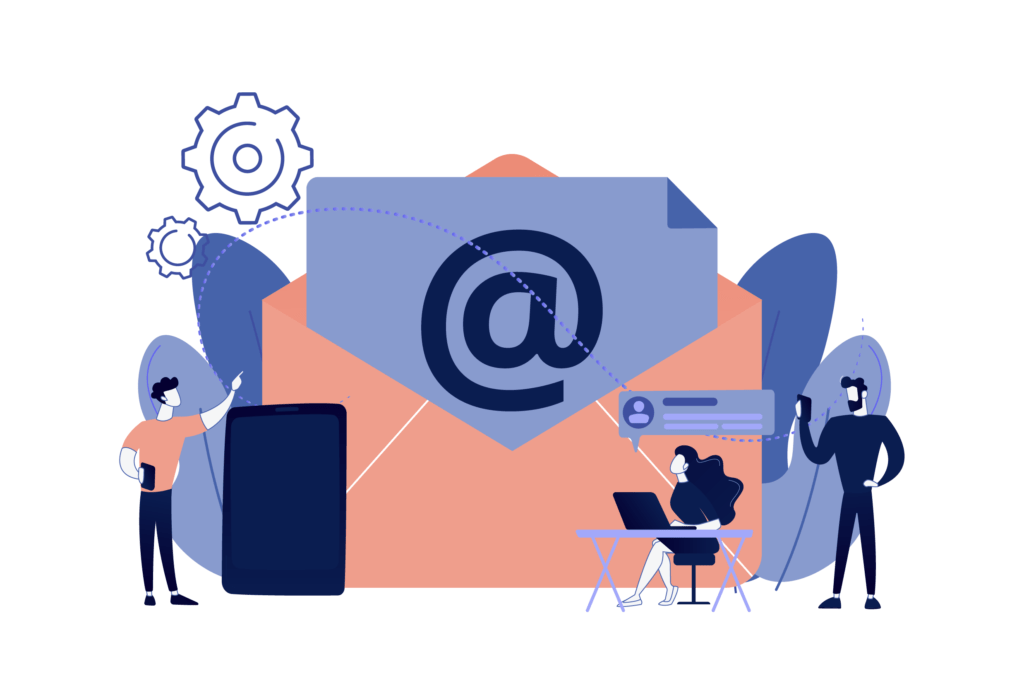For any business owner, an email marketing database is the single most valuable marketing asset you possess.
Does that sound like an exaggerated claim? You could be forgiven for thinking so, and you’re probably not alone. After all, we live in a world where there are so many instantly available online marketing platforms. There’s social media and YouTube, for example. So, that the good old email marketing database, your mailing list, seems to have gone the way of the dinosaurs.
Or has it? Here’s something that might prompt you to see things a little differently.
The Day the (Social Media) World Stopped
Question: do you spend more time on social media than you should?
If you’re anything like us, the answer is probably (definitely) yes. Of course, maybe you don’t, but that places you firmly in the blessed minority, according to statistics (and random people we speak to when we’re feeling chatty).
It seems incredible, but social media as an addictive feature of our lives hasn’t always been there: take Facebook, for example, the enfant terrible of the Internet:
- Facebook was only launched in 2004. It evolved quickly – but has also aged quickly.
- If Facebook was a human, it would barely be old enough to vote right now.
- Facebook has seen its fair share of good and bad press. Scandals, controversies, love and hate, congressional hearings, dank memes, and an awful lot of bad grammar.
- And, of course, it’s also become notorious for viral disinformation. A lot of it. Public trust in Facebook-generated information (including business and commercial information) is at an all-time low.
The Benefits of Social Media For Small Businesses
In fairness, particularly for small and medium sized business who rely on social media exposure, there have been some great benefits too:
- It’s a massive marketplace, offering easy and effective communication, and cool social groups that make you feel important.
- By design, it’s a global storefront that you could use to enchant and attract customers and build a really good following along the way. At a price, of course.
And when things are running smoothly, who needs an email marketing database?
Then, on October fifth, 2021, something dramatic happened.
Without fanfare, unannounced, Facebook just… vanished.
So did WhatsApp and Messenger and (gasp!) Instagram. Millions of influencers were left with nobody to influence. Millions of legitimate businesses were plunged into the dark, invisible to their customers. The sensation was similar to that feeling of incredulous disbelief when you come out of a mall to discover that your car is missing.

Crops Planted on Someone Else’s Land
That single event, although short-lived, proved to be a massive wake-up call. Literally millions of small business owners suddenly had no audience – and no income. The groups and tribes and business relationships that had been so carefully built and nurtured by smart people, were momentarily exposed for what they are: share crops planted on another farmer’s land.
Now, nobody’s anticipating that something like that will happen again in a hurry, or that Facebook and its collective empire might suddenly take a dive.
Hmm. Nobody anticipated the impact of Covid, either.
So, what’s the point? It’s this:
- As entrepreneurs, as business, we need to ensure that we can stay in touch – directly – with our customers at all times.
- Third-party platform instabilities must not be able to affect this.
- Of course, we’re talking about your email marketing database. And believe it or not, it’s such an effective marketing tool that it’s responsible for more actual sales via the internet than any other medium.
Time to Dust Off Your Email Marketing Database!
So, you might ask, if building an email marketing database is the best route to growing your business, why isn’t everyone doing it?
There are 2 key reasons why some might be hesitant:
- A mailing list requires work, diligence, and time to build and maintain.
- Many of us have grown to associate mail lists with spam and inbox irritation – and we don’t want our businesses lumped in with the spammers.
Nobody wants spam, of course. But what are customers seeking, then?
- Your customers are looking for honest communication and truthful business dealing, instead of the hype found every day on social media.
- There’s been a global awakening, a shift in priorities – evidenced by the phenomenon of The Great Resignation – and people are searching for the meaningful over the mundane.
- Personalize marketing content to your user’s unique wants and needs. We’re all tired of generic, one-size-fits-all messaging.
And that calls for a far more thoughtful approach to connecting with your customers. By all means continue to use social media and other UX-type platforms. But make sure that you’re also building a bridge to your audience that enables you to talk to them individually and selectively. Build a conduit for conversation that can’t be plunged into darkness if some hapless social media technician drops a spanner into a server.
The easiest and most cost-effective way to accomplish this is by making use of an email virtual assistant – someone who can professionally manage and grow your email marketing database.
Bulletproof Your Business
Public marketing platforms don’t affect you when you’re able to communicate directly with your audience. For example:
- Social media upheaval or shutdown won’t affect your ability to communicate with your customers.
- Altering advertising or search algorithms doesn’t matter anymore. Even if it takes your social media team a while to catch up to the changes.
- It doesn’t matter if advertising costs suddenly increase. Because you have a direct line to everyone who’s ever expressed interest in your product or service. And the ability to precisely target each segment with meaningful messages that will stimulate interest, loyalty, trust, and sales.
- Because you have an attentive audience, you can ask them to help build a bigger community of subscribers.
By doing this, you’re also making use of the Pareto Principle – the fascinatingly accurate predictor that says 80% of your income is generated by 20% of your clients. (There’s a corollary that says 20% of your customers generate 80% of your headaches, too!)
Build a genuine, engaged audience of people by actually mailing them and having conversations with them. Even if you’re outsourcing to a virtual secretary service. This also makes it a lot easier to figure out which ones you should really be focusing on.
And that makes all the difference.
Ready to build a powerful, profitable email marketing database?
Book a discovery call with us today and find out just how valuable a virtual assistant can be to the growth and marketing potential of your business.





